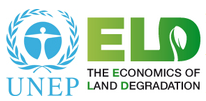A report co-published by the Economics of Land Degradation (ELD) Initiative and the UN Environment Programme (UNEP), titled 'The Economics of Land Degradation in Africa: Benefits of Action Outweigh the Costs,' examines the impact of erosion-induced soil nutrient depletion in 42 African countries, an area representing almost half of the total arable land used for cereal production.
In order to achieve many of the Sustainable Development Goals (SDGs) in the region, the report calls for increased integration of actions against land degradation with poverty reduction measures “aimed at harnessing the benefits of sustainable natural resource management towards increased national income, reduced food insecurity and poverty eradication.”
 November 2015: A report co-published by the Economics of Land Degradation (ELD) Initiative and the UN Environment Programme (UNEP), titled ‘The Economics of Land Degradation in Africa: Benefits of Action Outweigh the Costs,’ examines the impact of erosion-induced soil nutrient depletion in 42 African countries, an area representing almost half of the total arable land used for cereal production. In order to achieve many of the Sustainable Development Goals (SDGs) in the region, the report calls for increased integration of actions against land degradation with poverty reduction measures “aimed at harnessing the benefits of sustainable natural resource management towards increased national income, reduced food insecurity and poverty eradication.”
November 2015: A report co-published by the Economics of Land Degradation (ELD) Initiative and the UN Environment Programme (UNEP), titled ‘The Economics of Land Degradation in Africa: Benefits of Action Outweigh the Costs,’ examines the impact of erosion-induced soil nutrient depletion in 42 African countries, an area representing almost half of the total arable land used for cereal production. In order to achieve many of the Sustainable Development Goals (SDGs) in the region, the report calls for increased integration of actions against land degradation with poverty reduction measures “aimed at harnessing the benefits of sustainable natural resource management towards increased national income, reduced food insecurity and poverty eradication.”
The report concludes that investments in sustainable land management (SLM) interventions could prevent the loss of about 280 million tons of cereal crops and generate about US$71.8 billion each year.
In his foreword to the report, UNEP Executive Director Achim Steiner notes that soil erosion has led to the loss of nearly one-third of the world’s arable farmland in the last 40 years, “just as the number of people to be fed from it almost doubled.” Steiner highlights that the “good news” of the report is that while Africa remains the region most severely affected by land degradation and desertification, the benefits of taking action outweigh the costs “not just by a little, but by a factor of seven.”
The overall aim of the underlying study, which complements other studies by the ELD Initiative and its partners, was to provide empirical underpinnings for assessing the impacts of land degradation on agricultural ecosystems and crop production, and related efforts to achieve food security and improve livelihoods. The study adopted an econometric modelling approach that estimated the costs of inaction, costs of action and the net benefits of action against erosion-induced soil nutrient depletion using national level economic and biophysical data. The study team found a “positive and statistically significant relationship between the rate of poverty gap and soil nutrient depletion from cereal croplands in Africa,” with countries showing a higher rate of poverty gap in the period 2002–2004 also having a high average NPK loss (an indicator of soil fertility) from their agricultural lands and vice versa.
The report estimates that taking action through investment in SLM practices “will only cost about 344 billion PPP [Purchasing Power Parity] USD over the next 15 years,” which amounts to “about 9.4 billion USD, or 1.15 % of the GDP of the 42 countries.” It estimates the present value of net benefits of taking action against soil erosion over the next 15 years in the 42 African countries at “about 2.48 trillion PPP USD or 62.4 billion USD per year, which is equivalent to 5.31 % of their average Gross Domestic Product (GDP) for 2010–2012.” Contrasting this with the annuity value of the cost of inaction, estimated at 12.3 % of the average annual GDP of these countries over the same period, the report concludes that “the cumulative cost of inaction, which measures the maximum benefits of action, is far greater than the cumulative cost of action.”
[UNEP Knowledge Repository] [ELD Initiative Website] [Publication: The Economics of Land Degradation in Africa: Benefits of Action Outweigh the Costs] [Natural Resources Policy & Practice Story on ELD Synthesis Report on Value of Land